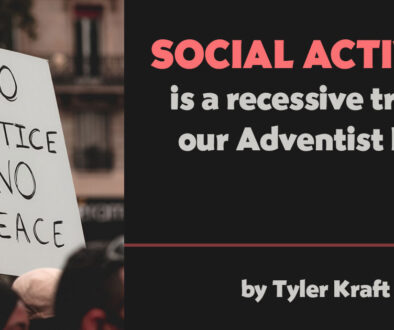When My Church Left Me
by Lindsey Abston Painter | 31 May 2024 |
I’m getting tired of people talking to me about how I “left the church.”
Technically, it’s true: I haven’t attended church in a number of years and my belief system is definitely not in line with the official Seventh-day Adventist message.
But I take issue with the description. I did not casually drift away from my faith. It was wrenched from my grasping hands. And it is insulting to me that people think otherwise.
The church pulled at me and pulled at me until finally I was forced to choose between my values—the ones I was taught in Cradle Roll—and the church. And the church lost.
It was the biggest trauma of my life. And that’s why I feel so defensive when people say that I “fell away” from my faith. Or that I was “too tempted by a life of sin.”
It is insulting because nobody knows more than I do how seriously I took my faith. It was my everything. I was a true believer. 100% in.
Honest questions
But there were always questions.
They weren’t questions asked out of doubt. They were questions asked from a sincere desire to understand the truth about God.
In Cradle Roll I was taught that Jesus touched the lepers when they were ostracized by society. He dined with tax collectors who greedily cheated others for their own gain. He loved prostitutes, showing them nothing but acceptance and compassion. Children were drawn to him. The weak and the sick were drawn to him. Those in pain were drawn to him. Sinners were drawn to him.
The story of Jesus is beautiful. It’s full of poetry. It includes the songs and stories of wise women. Jesus treated every person with an unwavering belief in their human value. He did become angry at injustice. But he treated every person, no matter how rejected by society, as worthy. He told us that the law is love. We learned that Jesus loves the little children—all the children of the world.
But as I got older, things started to change. You don’t help the vulnerable, they have to earn their way. Someone in the church got pregnant out of wedlock? She deserves to be rejected. Children are to be quiet and obedient. Oh, he’s gay? He can’t be in our church. Certain people aren’t worthy of compassion.
It was puzzling. Didn’t Jesus love radically? Didn’t he specifically love the most vulnerable of people?
Make it make sense!
My questions weren’t meant to threaten. They were meant to understand. What am I missing? What am I not understanding about God or scripture or culture that is keeping me from grasping this? I was a seeker of truth. Like our early church founders I dove into scripture, philosophy, ethics, and morality looking for answers to strengthen my faith.
But it turned out that the answers to my questions weren’t satisfying. They made the questions louder. I tried suppressing them. And I managed it, more or less successfully for over a decade of my adulthood.
And then, I couldn’t suppress them anymore. I had to be brave enough to ask myself if some of the things that I had always believed without question needed to be reexamined. It shredded me to ask those questions. It didn’t happen overnight. It was a journey of losing my faith, one painful piece at a time.
My relationship with the church became strained. We began fighting. I cried myself to sleep nights. I woke up at 5:00 in the morning so I could walk by myself in the woods and scream at God. I wanted this relationship to work!
But now Christianity’s message is so far from love that it’s unrecognizable.
A warped image of Jesus
Christianity has been warped and twisted from the beautiful message it began with. It has been hijacked by people with evil intention—people who recognize its ability to influence, so use its power for their own purposes.
Jesus didn’t live his life on earth trying to make sure people earn the right to compassion. He didn’t leverage people’s sincere beliefs to further a political agenda. He didn’t look to gain power or authority. He didn’t find ways to keep people out. He challenged the leaders of his day to include the people they were excluding.
I did not leave my church. It left me. I held fast to the core messages I was raised with. I believed in their beauty, the simplicity of love as the standard by which I decide how to act.
I grew up singing “Make me a servant, humble and meek. Lord, let me lift up those who are weak. And may the cry of my heart always be, make me a servant today” and “Break my heart for what breaks Yours, Lord.” I still believe those things I sang. I am still here, holding those same values.
But the church left me. And I was blamed for it.
It made me angry. I felt tricked. I felt cheated. I felt lied to. I felt betrayed. But most of all, I felt misunderstood. “I devoted my life to you!” I screamed at my church. “I gave you everything! And you still left me.”
I miss the church. So much. More than anything, I miss the singing. These days I can hardly bear to be near a church when there’s singing because I am so overcome with grief for losing my community and my identity.
I’ve grown
Don’t get me wrong. I consider my journey out of Seventh-day Adventism to be a growth experience. Like all growth, it was painful.
But also like all growth, I gained something new. I am proud of the life I have built post-Adventist.
Being Seventh-day Adventist will always be a part of me—even now. I loved my church, and I reflect (mostly) on those years of my life with fondness. Just because it ended doesn’t mean it was a failure. Many things in my life have ended. A marriage, and recently a job I loved. But just because it ends doesn’t mean it wasn’t beautiful.
And anyway, I’m not the one that left. If the church wants to be in a relationship with me, I would welcome it back, especially if it came with an apology and a vow to change. It knows my number.
But I’m not holding my breath.
 Lindsey Abston Painter is an Adventist Today writer and editor. She lives in northern California.
Lindsey Abston Painter is an Adventist Today writer and editor. She lives in northern California.




